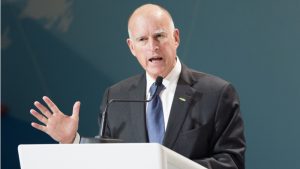The U.S. Department of Agriculture today announced the launch of an interactive data tool to display substance abuse data along with other public information, allowing local leaders to “build grassroots strategies to address the opioid epidemic,” the department said in its announcement.
The Senate Commerce, Science, and Transportation Committee heard testimony today detailing the workings of data privacy laws in Europe and California–specifically the European Union’s General Data Protection Regulation (GDPR) and the California Consumer Privacy Act (CCPA)–amid a growing groundswell for Congress to work on a national data privacy law for the U.S.
Gov. Jerry Brown on Sept. 28 signed into law S.B. 327, which will ban companies from selling Internet-connected devices with weak or default passwords, such as “Password” or “1234567.” Instead, beginning on Jan. 1, 2020, all devices must have a “preprogrammed password [that] is unique to each device manufactured.” A primary concern with weak pre-programmed passwords is that users don’t change them to strong, unique passwords after purchasing the device.
To help create a smart city, local governments need to think creatively about how to acquire new technology through new financing models and partnerships, said public and private sector participants during a panel at the Smart Cities Week conference.
A group of 24 technology organizations banded together to urge the Senate to pass S. 3157, the STREAMLINE Small Cell Deployment Act. In a letter released today, the group said the legislation “will modernize wireless infrastructure regulations for next-generation 5G wireless networks” and will unlock “significant consumer and economic benefits.”
California Governor Jerry Brown on Sept. 29 signed S.B. 1001 into law. The legislation prohibits automated accounts–colloquially known as bots–from pretending to be human when attempting to “incentivize a purchase or sale of goods or services in a commercial transaction or to influence a vote in an election.”
Sen. James Lankford, R-Okla., told Politico to expect an updated version of the Secure Elections Act to hit the Senate floor next month.
The Federal Communications Commission (FCC) today approved by a 3-1, party-line vote a series of steps that its Republican-majority commissioners argue will speed the pace of infrastructure installations necessary for carriers to provide 5G wireless services, but which have drawn strong protest from states and localities in the run-up to today’s vote who object to restrictions on their ability to govern.
California’s Democratic Governor Jerry Brown on Sunday signed S.B. 822 , which restores in the state Obama-era Federal net neutrality laws that were gutted by the Federal Communications Commission (FCC) earlier this year.
As the FCC prepares to vote next week on an order that would make it easier for wireless service providers to deploy small wireless antennas and other infrastructure to speed the deployment of fifth-generation–or 5G–services, two of the agency’s five commissioners discussed the pros and cons of taking that course at an event organized by Politico.











